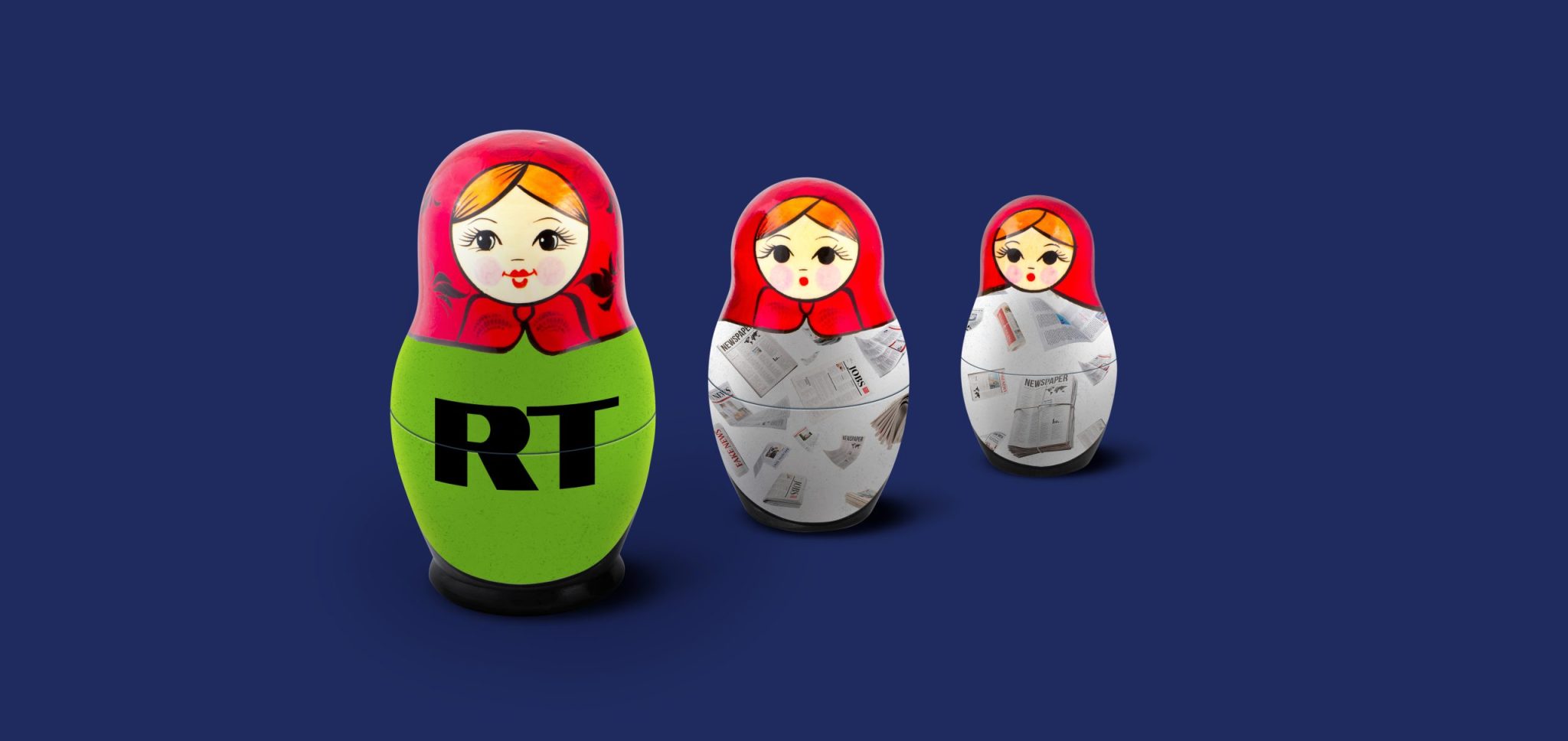New Information Laundromat tool used to analyze how RT.com skirts sanctions and platform bans
Washington, D.C. – The Alliance for Securing Democracy at the German Marshall Fund of the United States (ASD at GMF), the University of Amsterdam (UvA), and the Institute for Strategic Dialogue (ISD) today announced the Information Laundromat, an open-source tool designed to uncover content and metadata similarities between and among websites. Using the laundromat tool, researchers examined content laundering practices across the web, highlighting the myriad pathways through which content from Russian state media website RT.com reaches audiences in Europe and the United States, despite platform bans and EU sanctions.
In The Russian Propaganda Nesting Doll: How RT is Layered into the Digital Information Environment, researchers discovered roughly 400 domains—ranging from mirror sites and content aggregators to faux local news outlets and sites ostensibly focused on spirituality and men’s interests—that republished articles that were identical or nearly identical to those that originated on RT.com.
“This report makes clear that people need not access RT, or even know of its existence, to encounter Russian propaganda online. The fact that we found RT on hundreds of sites that have no obvious affiliation with the Russian government is problematic, not only because it allows RT to skirt sanctions and restrictions, but also because it strips news consumers of the context that they need to evaluate the reliability of the information the encounter online,” said Bret Schafer, Senior Fellow for information manipulation at ASD at GMF.
KEY REPORT FINDINGS
Lifestyle and spirituality sites with a side of Russian war propaganda. Many of the sites that regularly repost RT content are not, at least overtly, news sites. This includes sites like manstuffnews[.]com, a site largely dedicated to sports, grilling, cars, and other stereotypical “men’s interests”, but whose “world news” section is sourced almost exclusively from RT. There are also several sites ostensibly focused on wellness, spirituality, and religion that launder RT content—including a site connected to a Christian ministry in Texas, one focused on the rapture, and a “conspirituality” site connected to an alleged human trafficker that blends wellness, new age religiosity, and pro-Kremlin geopolitics.
AI-generated journalists and faux-local news sites. Russia’s propaganda network includes faux-local news sites that look and sound like they could be authentic local news outlets. The San Francisco Telegraph (sanfranciscotelegraph[.]com) is a legitimate sounding outlet that, in fact, sources much of its “news” content from RT.com. Similarly, Kigali Daily News (kigalidailynews[.]com), a site purporting to be based in Rwanda, belies its supposed African roots by publishing a section devoted to the Russia-Ukraine war that is sourced entirely from RT but attributed to a fictitious local journalist.
Links to anti-Semitism. We also found evidence of RT reposts on several sites promoting anti-Semitism and other forms of hate speech. This includes jewworldorder[.]com, a site, as its anti-Semitic name suggests, that promotes Holocaust denialism and a range of deplorable and racist worldviews, and shoah[.]org[.]uk, a site supposedly dedicated to ending “Zio-Nazi” destruction that incongruously posts anti-LGBT and anti-Ukrainian President Volodymyr Zelenskyy commentary as well. This suggests that, at a minimum, there is an overlapping ecosystem of those attracted to Russian propaganda and extremist ideologies.
Authoritarians helping authoritarians – and Hezbollah. RT articles were republished, verbatim, on state-controlled or state-captured media outlets in Cambodia, Lebanon, Namibia, Nigeria, Zimbabwe, Yemen, and Iran. We also found evidence of RT content repeatedly republished on Al Manar TV (almanar[.]com[.]lb), a Lebanese outlet owned and operated by Hezbollah that is designated a “special terrorist entity” and banned in the United States and multiple European countries.
EU Sanctions? Not a problem for RT content. Despite RT being effectively blocked in EU search results, RT content was widely available in Europe when republished on third party websites whose domains are not subject to sanctions. We found more than 3,019 unique links on 316 domains in EU search results that linked to content that was identical or a near duplicate to queried RT articles.
Platform bans? Also not a problem. Though we do not categorize link sharing on social media as “information laundering”, social media and user-generated video sites play a significant role in the dissemination of laundered RT content in search results. Reddit and YouTube ranked among the 15 most observed domains in our study, despite the fact that Reddit has banned all links to RT and YouTube has blocked all channels affiliated with RT. On Reddit, users bypassed restrictions by linking to RT articles posted on mirror or content reposter sites; on YouTube, RT articles were narrated using an automated text-to-speech generator. Those tactics allowed content from RT to not only appear on those platforms but to spread across the open web, boosted by the “authoritativeness” of those respective domains. In our study, we also found links on tested search engines of original or reposted RT articles posted on Gab, Telegram, Facebook, Twitter, LinkedIn, Substack, VKontakte, Instagram, Pinterest, 8kun, and Rumble.
INFORMATION LAUNDROMAT DETAILS: The Information Laundromat is a lead generation tool used to determine if and how websites share architecture and content. It provides two core functions: content similarity and domain forensics matching Read more: https://informationlaundromat.com/about.
LINKS & RESOURCES
- Interact with the Information Laundromat here.
- From Russia With Spin: How Content From Russian State Media is Laundered by Polish Blogs
- The Russian Propaganda Nesting Doll: How RT is layered into the digital information environment
Reporters interested in an Information Laundromat briefing or interview should reach out to [email protected].
The views expressed in GMF publications and commentary are the views of the author alone.




